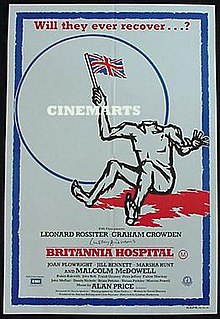
Chariots of Fire is a 1981 British historical sports drama film directed by Hugh Hudson, written by Colin Welland and produced by David Puttnam. It is based on the true story of two British athletes in the 1924 Olympics: Eric Liddell, a devout Scottish Christian who runs for the glory of God, and Harold Abrahams, an English Jew who runs to overcome prejudice. Ben Cross and Ian Charleson star as Abrahams and Liddell, alongside Nigel Havers, Ian Holm, John Gielgud, Lindsay Anderson, Cheryl Campbell, Alice Krige, Brad Davis and Dennis Christopher in supporting roles. Kenneth Branagh makes his debut in a minor role.
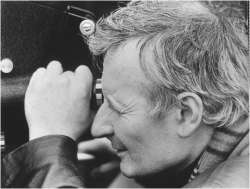
Lindsay Gordon Anderson was a British feature-film, theatre and documentary director, film critic, and leading-light of the Free Cinema movement and of the British New Wave. He is most widely remembered for his 1968 film if...., which won the Palme d'Or at Cannes Film Festival in 1969 and marked Malcolm McDowell's cinematic debut. He is also notable, though not a professional actor, for playing a minor role in the Academy Award-winning 1981 film Chariots of Fire. McDowell produced a 2007 documentary about his experiences with Anderson, Never Apologize.

Leonard Rossiter was an English actor. He had a long career in the theatre but achieved his highest profile for his television comedy roles starring as Rupert Rigsby in the ITV series Rising Damp from 1974 to 1978, and Reginald Perrin in the BBC's The Fall and Rise of Reginald Perrin from 1976 to 1979.
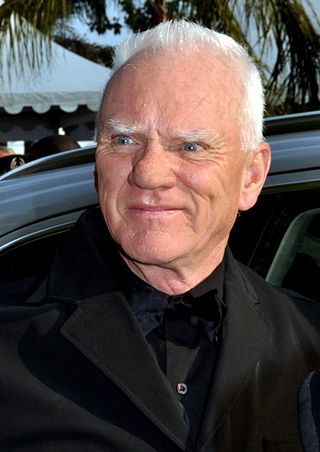
Malcolm McDowell is an English actor. He is known for portraying Alex DeLarge in A Clockwork Orange (1971), and as the title character in Lindsay Anderson's Mick Travis trilogy: if.... (1968), O Lucky Man! (1973), and Britannia Hospital (1982). It was his performance as a rebel schoolboy in if.... that prompted Stanley Kubrick to cast him in A Clockwork Orange.
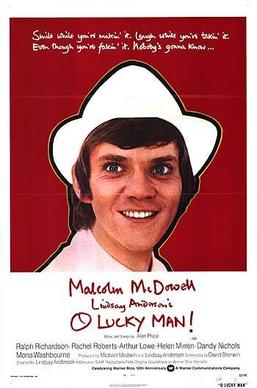
O Lucky Man! is a 1973 British comedy-drama fantasy film directed by Lindsay Anderson, and starring Malcolm McDowell as Mick Travis, whom McDowell had first played as a disaffected public schoolboy in his first film performance in Anderson's film if.... (1968). The film was entered into the 1973 Cannes Film Festival.

Alan Price is an English musician who first found prominence as the original keyboardist of the English rock band the Animals. He left the band in 1965 to form the Alan Price Set; his hit singles with and without the group include "Simon Smith and the Amazing Dancing Bear", "The House That Jack Built", "Rosetta" and "Jarrow Song". Price is also known for work in film and television, taking occasional acting roles and composing the soundtrack of Lindsay Anderson's film O Lucky Man! (1973). He was inducted into the Rock and Roll Hall of Fame in 1994 as a member of the Animals.

If.... is a 1968 British satirical drama film produced and directed by Lindsay Anderson, and starring Malcolm McDowell as Mick Travis, Richard Warwick, Christine Noonan, David Wood, and Robert Swann. A satire of English public school life, the film follows a group of pupils who stage a savage insurrection at a boys' boarding school. The film was the subject of controversy at the time of its release, receiving an X certificate for its depictions of violence.

Clement Graham Crowden was a Scottish actor. He was best known for his many appearances in television comedy dramas and films, often playing eccentric scientist, teacher and doctor characters.

The Irish Rovers is a group of Irish musicians that formed in Toronto, Canada in 1963 and named after the traditional song "The Irish Rover". They are best known for their international television series, contributing to the popularization of Irish Music in North America, and for the songs "The Unicorn", "Drunken Sailor", "Wasn't That a Party", "The Orange and the Green", "Whiskey on a Sunday", "Lily the Pink", "Finnegan's Wake" and "The Black Velvet Band".

Nora Noel Jill Bennett was a British actress.

Peter Jeffrey was an English character actor. Starting his performing career on stage, he later portrayed many roles in television and film.
Michael Hugh Medwin, OBE was an English actor and film producer.
Brian Pettifer is a South African actor who has appeared in many television shows, and also on stage and in film. He is the younger brother of folk musician Linda Thompson.

Rec is a 2007 Spanish found footage horror film co-written and directed by Jaume Balagueró and Paco Plaza. The film stars Manuela Velasco as a reporter who, with her cameraman, accompany a group of firefighters on an emergency call to an apartment building to discover an infection spreading inside, with the building being sealed up and all occupants ordered to follow a strict quarantine.

Vivian Pickles is an English actress.
Michael Arnold "Mick" Travis is a fictional character played by Malcolm McDowell in three films directed by British film director Lindsay Anderson and written by David Sherwin. Travis features not so much as a single character with a character arc, but as an everyman character whose role changes according to the needs of the storyteller.
David Sherwin-White was a British screenwriter best known for his collaborations with director Lindsay Anderson and actor Malcolm McDowell on the films if.... (1968), O Lucky Man! (1973) and Britannia Hospital (1982).

Mark Richard Hamill is an American actor. He starred as Luke Skywalker in the Star Wars franchise, in the original and sequel trilogies.
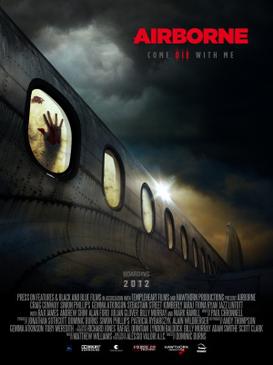
Airborne is a 2012 British horror film written by Paul Chronnell and directed by Dominic Burns, who describes it as a tongue-in-cheek film in the tradition of The Twilight Zone. A first trailer was released in 2011. It was reported in the media that it presents Mark Hamill's first appearance in a British film; however, Hamill had acted previously in the 1982 British film Britannia Hospital. Airborne's introduction, before sporting a voice-over by Mark Hamill, refers in writing to a so-called Firelight Protocol.
Fred Wood, died January 2003) was an English actor.
